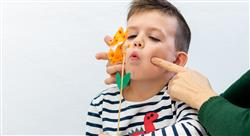University certificate
The world's largest faculty of medicine”
Introduction to the Program
Thanks to this Professional master’s degree, in 12 months you will be up to date with the most notable advances in the early detection of delays in speech development"

The medical professional, especially in Primary Care, plays a relevant role in the detection of certain pathologies at an early age. These include speech, language and communication disorders. These are quite frequent manifestations, which cause concern among parents and health care professionals, but which have made great progress in recent years thanks to studies that have achieved remarkable advances in the understanding of neurodevelopmental processes and improved intervention techniques.
The physician, therefore, is a key player for the child who presents dyslalia, dyslexia or autism and whose identification in the so-called "critical periods" or "windows of opportunity" are decisive in order to achieve optimal recovery and improvement results. For this reason, TECH has designed a university degree that offers the professional the latest information on the assessment, diagnosis and intervention in children with Speech, Language and Communication Disorders. All this from the hand of a team of specialized professionals with extensive professional experience.
In this way, through innovative multimedia content, the professional will be able to learn more about genetic syndromes, the current classification of autism spectrum disorder, Asperger's disorder, Rett or pervasive developmental disorders. Likewise, the Relearning system, based on the reiteration of content, will allow students to progress through the syllabus in a much more agile way. This favors an exhaustive and reliable update of knowledge, based on the latest scientific evidence on patients with hearing impairment or child and adolescent dysarthria.
The professionals are also faced with a program taught exclusively in online mode, which they can access comfortably whenever and wherever they wish. Students taking this Professional master’s degree will be able to view the syllabus of this degree at any time from an electronic device with an internet connection. In addition, TECH gives healthcare professionals the freedom to distribute the teaching load according to their needs, which allows them to balance their personal and/or work responsibilities with an education that is at the forefront of the academic field.
Easily access the latest scientific studies on Speech, Language and Communication Disorders from your computer at any time”
This Professional master’s degree in Medical Approach to Speech, Language, and Communication Disorders contains the most complete and up-to-date educational program on the market. Its most notable features are:
- Development of more than 75 case studies presented by experts in Speech, Language and Communication Disorders
- The graphic, schematic, and practical contents with which they are created provide scientific and practical information on the disciplines that are essential for professional practice
- Latest developments in Speech, Language, and Communication Disorders
- It contains practical exercises where the self-assessment process can be carried out to improve learning
- With special emphasis on innovative methodologies in Speech, Language, and Communication Disorders
- All of this will be complemented by theoretical lessons, questions to the expert, debate forums on controversial topics, and individual reflection assignments
- Content that is accessible from any fixed or portable device with an internet connection
With this cdegree you will learn about the determining factors of disorders in childhood and adolescence, as well as the areas of the brain involved in the attentional processes”
The program’s teaching staff includes professionals from the sector who contribute their work experience to this training program, as well as renowned specialists from leading societies and prestigious universities.
The multimedia content, developed with the latest educational technology, will provide the professional with situated and contextual learning, i.e., a simulated environment that will provide immersive training programmed to train in real situations.
This program is designed around Problem-Based Learning, whereby the professionals must try to solve the different professional practice situations that arise throughout the program. For this purpose, the student will be assisted by an innovative interactive video system created by renowned and experienced experts.
Detailed videos and case studies are two key teaching tools available to you to update your knowledge of language disorders"

The Relearning system applied by TECH will allow you to progress in a much more natural way through the advanced content of this program"
Why study at TECH?
TECH is the world’s largest online university. With an impressive catalog of more than 14,000 university programs available in 11 languages, it is positioned as a leader in employability, with a 99% job placement rate. In addition, it relies on an enormous faculty of more than 6,000 professors of the highest international renown.

Study at the world's largest online university and guarantee your professional success. The future starts at TECH”
The world’s best online university according to FORBES
The prestigious Forbes magazine, specialized in business and finance, has highlighted TECH as “the world's best online university” This is what they have recently stated in an article in their digital edition in which they echo the success story of this institution, “thanks to the academic offer it provides, the selection of its teaching staff, and an innovative learning method aimed at educating the professionals of the future”
A revolutionary study method, a cutting-edge faculty and a practical focus: the key to TECH's success.
The most complete study plans on the university scene
TECH offers the most complete study plans on the university scene, with syllabuses that cover fundamental concepts and, at the same time, the main scientific advances in their specific scientific areas. In addition, these programs are continuously being updated to guarantee students the academic vanguard and the most in-demand professional skills. In this way, the university's qualifications provide its graduates with a significant advantage to propel their careers to success.
TECH offers the most comprehensive and intensive study plans on the current university scene.
A world-class teaching staff
TECH's teaching staff is made up of more than 6,000 professors with the highest international recognition. Professors, researchers and top executives of multinational companies, including Isaiah Covington, performance coach of the Boston Celtics; Magda Romanska, principal investigator at Harvard MetaLAB; Ignacio Wistumba, chairman of the department of translational molecular pathology at MD Anderson Cancer Center; and D.W. Pine, creative director of TIME magazine, among others.
Internationally renowned experts, specialized in different branches of Health, Technology, Communication and Business, form part of the TECH faculty.
A unique learning method
TECH is the first university to use Relearning in all its programs. It is the best online learning methodology, accredited with international teaching quality certifications, provided by prestigious educational agencies. In addition, this disruptive educational model is complemented with the “Case Method”, thereby setting up a unique online teaching strategy. Innovative teaching resources are also implemented, including detailed videos, infographics and interactive summaries.
TECH combines Relearning and the Case Method in all its university programs to guarantee excellent theoretical and practical learning, studying whenever and wherever you want.
The world's largest online university
TECH is the world’s largest online university. We are the largest educational institution, with the best and widest online educational catalog, one hundred percent online and covering the vast majority of areas of knowledge. We offer a large selection of our own degrees and accredited online undergraduate and postgraduate degrees. In total, more than 14,000 university degrees, in eleven different languages, make us the largest educational largest in the world.
TECH has the world's most extensive catalog of academic and official programs, available in more than 11 languages.
Google Premier Partner
The American technology giant has awarded TECH the Google Google Premier Partner badge. This award, which is only available to 3% of the world's companies, highlights the efficient, flexible and tailored experience that this university provides to students. The recognition as a Google Premier Partner not only accredits the maximum rigor, performance and investment in TECH's digital infrastructures, but also places this university as one of the world's leading technology companies.
Google has positioned TECH in the top 3% of the world's most important technology companies by awarding it its Google Premier Partner badge.
The official online university of the NBA
TECH is the official online university of the NBA. Thanks to our agreement with the biggest league in basketball, we offer our students exclusive university programs, as well as a wide variety of educational resources focused on the business of the league and other areas of the sports industry. Each program is made up of a uniquely designed syllabus and features exceptional guest hosts: professionals with a distinguished sports background who will offer their expertise on the most relevant topics.
TECH has been selected by the NBA, the world's top basketball league, as its official online university.
The top-rated university by its students
Students have positioned TECH as the world's top-rated university on the main review websites, with a highest rating of 4.9 out of 5, obtained from more than 1,000 reviews. These results consolidate TECH as the benchmark university institution at an international level, reflecting the excellence and positive impact of its educational model.” reflecting the excellence and positive impact of its educational model.”
TECH is the world’s top-rated university by its students.
Leaders in employability
TECH has managed to become the leading university in employability. 99% of its students obtain jobs in the academic field they have studied, within one year of completing any of the university's programs. A similar number achieve immediate career enhancement. All this thanks to a study methodology that bases its effectiveness on the acquisition of practical skills, which are absolutely necessary for professional development.
99% of TECH graduates find a job within a year of completing their studies.
Professional Master's Degree in Medical Approach to Speech, Language and Communication Disorders
Taking into account that, in order to carry out a successful intervention in pathologies of this type, it is necessary to have solid competencies in the diagnostic study and treatment, in TECH Global University has created this program specialized in the etiology of the alterations of the stomatognathic and auditory system. The curriculum, in detail, presents the basics of speech therapy and language to subsequently cover the evaluation processes of dyslalia, dyslexia, specific language disorder, autism, dysphemia, dysarthria, genetic syndromes and hearing impairment. In addition to this, it exposes in depth some psychological aspects that are essential for the practical speech therapy field. At the end of this complete course, students are expected to master the therapeutic resources of this discipline and use them appropriately, always considering the degree of influence of contextual and psychosocial variables in the permanence of complications.
Professional Master's Degree in Speech, Language and Communication Disorders
Studying this Postgraduate Certificate offered by TECH is an important opportunity to acquire and strengthen skills in the realization of each of the stages that make up the medical approach process: detection, assessment, application of speech therapy procedures and their respective follow-up control. In addition, thanks to the tools provided here, it is possible to design or transform the materials available for intervention, in order to guarantee the effectiveness of the rehabilitative activities. Similarly, from the appropriation of the knowledge concerning the psycholinguistic production of the Spanish language, the professional in this area will be able to develop comprehensive and individualized action frameworks, aimed at stimulating the physical-cognitive development of the patient. And, at a more advanced level, to build detailed prevention protocols. This Professional Master's Degree, then, empowers you for the direct care of the alteration, with special emphasis on strategies that circumvent the obstacles in the exchange and correspondence of information.







